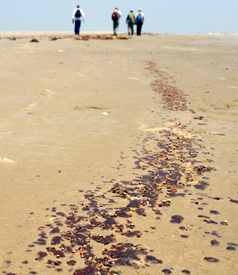Did you know that Truthout is a nonprofit and independently funded by readers like you? If you value what we do, please support our work with a donation.
Instead of sitting helplessly on the sidelines, here are six things every American can do.
BP has failed repeatedly to stop the gushing oil disaster in the Gulf. It’s trying again – using a technique that risks making matters worse – and saying that there may be no repair until August, when it finishes drilling relief wells.
The media, meanwhile, is treating much of the news from the Gulf like it’s a contest between the “Drill Baby Drill” crowd and the Obama administration. It’s not. It’s a national disaster.
While those of us outside the world of deep-sea engineering have limited knowledge, there are some things we can and should demand:
1. The federal government needs to take charge and put BP under temporary receivership as recommended by former Labor Secretary Robert Reich. BP was dishonest about the quantities of oil flowing into the Gulf, and their initial repair efforts have failed. The federal government is accountable to the American people, and it needs to decide what to do to protect our nation’s water, wildlife, and shorelines of the Gulf (and wherever else the oil travels). As Reich argues, receivership would allow the government to act with full authority and accountability, and to call on all the expertise available (not just BP’s) to help make the difficult calls.
2. The cleaning and protection of coastlines needs to be ramped up. Whether that means hiring more local fishers, bringing in National Guard troops, or deploying citizen brigades on the beaches, the response needs to be aggressive and sustained. Even if the oil stopped flowing today, the contamination would continue washing up in sensitive coastal regions for months or longer. All workers should have training, equipment, and protective gear to keep them from being sickened by the oil and the toxic dispersants.
3. There should be generous pay for the armies of bird-rescuers and beach cleaners, and those out protecting shorelines with boats and booms. Families who are the immediate victims of the disaster should get first crack at the jobs, and their wages will help sustain the region through this economic storm. Charge BP (and any other companies responsible for the disaster) the full costs for as long as it takes to get this region clean, whether it’s months or years.
4. Use the least toxic chemical dispersants and insist on full disclosure of the makeup of all the dispersants being dumped into the Gulf. The U.S. EPA should determine which dispersants, if any, are used based on the long-term health of the Gulf and its shorelines and estuaries, not based on which companies have ties with BP or which chemicals will be most likely to hide the effects and protect BP from embarrassing images of oil slicks. Use emergency powers, if necessary, to get a full disclosure of the makeup of the dispersants from BP or whoever is refusing to release it. Without this information, there’s no way to keep the emergency responders safe, to properly treat stricken birds and sea life, and to assess the long-term damage.
5. Boycott BP, but also other oil companies. They are all spilling oil (see what Shell is doing in Nigeria, for example), and causing direct environmental damage. But using oil, no matter what company pumps it, is putting our entire planet at risk through disruption of the climate. Melting ice caps, changing rainfall patterns, mega-storms and failing crops are already happening, but that is only the beginning if we start hitting climate tipping points. We must kick our fossil fuel addiction. This is our part of the solution.
6. Begin a massive conversion to energy efficiency and renewable energy. There is a lot of blame to go around for this disaster, from the practice of putting cronies in charge of regulation to the corporate culture of putting profits above all else. But this disaster is above all happening because the oil that is easy to get to is already taken. Now oil companies are trying to get the oil that’s hard to reach, from deep under the oceans, from hostile regions of the world, and from dirty and destructive sources like tar sands. We’ve entered a time that analyst and author Michael Klare calls “The Age of Tough Oil,” and the costs-human, environmental, economic, and strategic-are rising with each new barrel. Making our economy more energy efficient and building a renewable energy infrastructure offer immediate benefits in terms of jobs and economic stimulus and will sustain generations to come.
Sarah van Gelder wrote this article for YES! Magazine, a national, nonprofit media organization that fuses powerful ideas with practical actions. Sarah is executive editor for YES! Magazine.
Trump is silencing political dissent. We appeal for your support.
Progressive nonprofits are the latest target caught in Trump’s crosshairs. With the aim of eliminating political opposition, Trump and his sycophants are working to curb government funding, constrain private foundations, and even cut tax-exempt status from organizations he dislikes.
We’re concerned, because Truthout is not immune to such bad-faith attacks.
We can only resist Trump’s attacks by cultivating a strong base of support. The right-wing mediasphere is funded comfortably by billionaire owners and venture capitalist philanthropists. At Truthout, we have you.
Our fundraising campaign is over, but we fell a bit short and still need your help. Please take a meaningful action in the fight against authoritarianism: make a one-time or monthly donation to Truthout. If you have the means, please dig deep.
